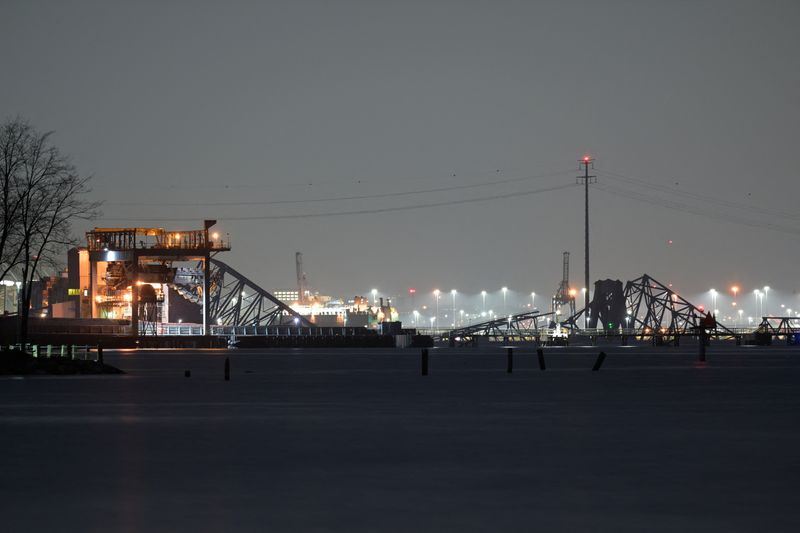By David Lawder
WASHINGTON (Reuters) -The catastrophic bridge collapse that closed the Port of Baltimore to ship traffic on Tuesday is causing some logistics headaches, but is unlikely to trigger a major new U.S. supply chain crisis as competing East Coast ports are poised to handle more cargo, economists and logistics experts say.
With six people presumed dead after a container ship collision destroyed the Francis Scott Key Bridge, it remained unclear how long the span's twisted superstructure would block the harbor's mouth.
But port officials from New York to Georgia were busy fielding queries from shippers about diverting Baltimore-bound cargo from containers to vehicles and bulk material.
"We're ready to help. We have ample capacity to absorb any surge in container traffic," Port of Virginia spokesperson Joe Harris told Reuters.
The Norfolk-based port is expected to be a major beneficiary due to its proximity to Baltimore, but ports in Savannah and Brunswick (NYSE:BC), Georgia, also were poised to absorb some traffic, a spokesperson for the Georgia Ports Authority said.
U.S. Transportation Secretary Pete Buttigieg told MSNBC on Wednesday that while there were many ports on the East Coast, "there is no substitute for the Port of Baltimore being up and running," as it is the top U.S. port for vehicle imports and exports, including farm and construction machinery.
Treasury Secretary Janet Yellen said a federal supply chain task force was meeting on Wednesday to assess the port's closure but said the Biden administration "will do everything as quickly as we possibly can" to reopen it.
Supply chain experts say U.S. port infrastructure is more resilient than during 2021 and 2022, when they were understaffed and clogged with ships and containers, spiking prices and contributing to inflation as Americans binged on goods purchases during the COVID-19 pandemic.
"The collapse of the Francis Scott Key Bridge in Maryland is another reminder of the U.S. vulnerability to supply-chain shocks, but this event will have greater economic implications for the Baltimore economy than nationally," Ryan Sweet, chief U.S. economist at Oxford Economics, wrote in a note.
"We don’t anticipate that the disruptions to trade or transportation will be visible in U.S. GDP, and the implications for inflation are minimal," he added.
NO SHIPS, NO WORK
The impact on the Port of Baltimore's more than 2,000 workers who load and unload cargo vessels could be significant if the closure lasts more than a few days.
The dockworkers are day laborers, said Scott Cowan, head of the International Longshoreman's Association Local 333 in Baltimore, meaning they only work when there is cargo to be moved. He estimated there might be about a week's work clearing the existing inventory at the port.
After that, the workers could lose a collective $2 million a day in lost wages, he said.
The port directly generates over 15,000 jobs, with an additional 140,000 jobs dependent on port activity, according to Maryland Governor Wes Moore's office.
VEHICLE PORT
One area of concern is higher shipment costs for imported cars and trucks and for exports of farm tractors and construction equipment as Baltimore is the largest U.S. port for "roll-on, roll-off" vehicle shipments, with over 750,000 cars and light trucks handled by state-owned terminals in 2023, according to Maryland Port Administration data.
Ford Motor (NYSE:F) Co and General Motors (NYSE:GM) said they would reroute some affected shipments but the impact would be minimal, while Volkswagen (ETR:VOWG_p) is unaffected because its new Sparrows Point vehicles terminal is located at a former steel mill site on the bridge's Chesapeake Bay side.
The risk of car price spikes is further dampened by a recovery in automotive inventories to their highest level since May 2020, after being drawn down sharply during the pandemic. The industry's inventory-to-sales ratio is near its 32-year-average of 1.96 to 1 according to Census Bureau data, and sales incentives have risen in recent months as high interest rates dampen demand.
COASTAL SHIFT
Ryan Peterson, founder and CEO of logistics platform Flexport, said that with Baltimore handling only 1.1 million twenty-foot equivalent containers last year - ranking 12th in the U.S., any impact on container rates and shipping costs from the disruption would be far less than increases caused by cargoes diverted from the Suez Canal because of attacks on Red Sea shipping by the Houthi militant group in Yemen.
But the port outage could contribute to a shift of container traffic to West Coast U.S. ports that was already underway over the past several months because of the lack Asian shippers' access to the Suez route and reduced capacity in the Panama Canal due to low water levels. Peterson said the potential for an East Coast longshoreman strike in late September - at the height of Christmas-season imports - also has some shippers considering West Coast shipments.
"East Coast volumes are down and there is the ability for those ports to flex up to handle this," Peterson said.
